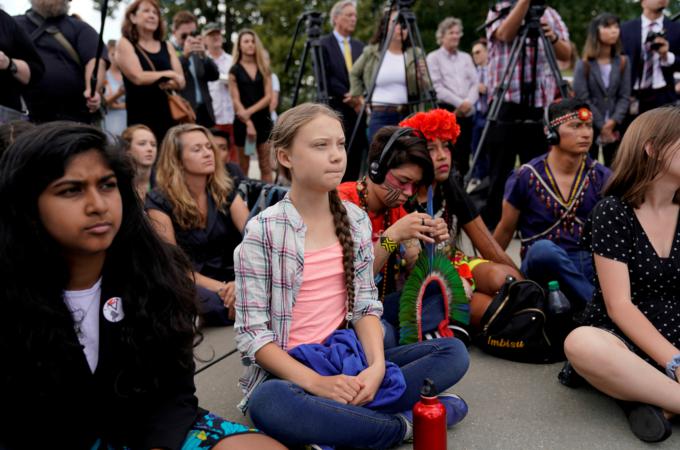The regrettable episode with Greta Thunberg
Unless you were sleeping last month, you probably caught at least a glimpse of the newsmaking 16-year-old Swede, Greta Thunberg, on her U.S. tour. While on American soil, the environmental activist addressed Congress, attended a global climate strike in Manhattan, conducted interviews with national media and delivered a passionate address at the United Nations Climate Action Summit that went viral.
In that speech, Greta laid out the scientific facts on the tipping points we are reaching and the predicted chain of events that will follow should global actors fail to change course.
Then she spoke plainly:
"You are failing us. But the young people are starting to understand your betrayal. The eyes of all future generations are upon you. And if you choose to fail us, I say: We will never forgive you.
"We will not let you get away with this. Right here, right now is where we draw the line. The world is waking up. And change is coming, whether you like it or not."
The polarized reactions from political commentators could have been written in advance: On the right, Greta was painted as a prop of left-wing propaganda, a teen whose parents should be charged with neglect. On the left, Greta was hailed as a modern-day prophet, not only a voice for the climate, but for youth activism on any issue and female empowerment, whether she intended this or not.
The reactions from prominent Catholics to Greta's speech were more shocking and shameful. They ranged from mocking her Asperger's syndrome and appearance to saying that her anger would have been justifiable only if she were speaking about abortion instead of the climate.
These reactions fell well below the bar of how Catholics should engage in the public square.
First, they were sins against charity. Start with Matthew 7:12: "Do to others whatever you would have them do to you."
Or look at Gospel on the day she delivered the address, Sept. 23: "For there is nothing hidden that will not become visible, and nothing secret that will not be known and come to light. Take care, then, how you hear." If there was ever an example of careless listening, this was it.
Second, they flew in the face of the principle of the Catholic intellectual tradition articulated by St. Augustine: "Let every good and true Christian understand that wherever truth may be found, it belongs to his Master." Catholicism synthesizes what is true in philosophy, art, science and other disciplines with revelation.
Catholics are committed to the defense of the unborn, the biblical meaning of sex, marriage and procreation, and the humanity of persons with disabilities. In making the case for these in the public square, we use science to demonstrate how religious claims are defensible on nonreligious terms.
Why when it comes to the rest of the natural ecosystem would we set aside this tactic? Inconsistency in application will only serve to unravel the threads of our tightly woven moral tapestry.
Third, the Church is to "read the signs of the times." Pope Francis has made it clear for six years that the promotion of an integral ecology is what is most needed now.
This means that we are to do everything in our power to show how the care for all of creation, from plant life to its pinnacle -- human beings -- are connected in both a natural ecosystem and a spiritual ecosystem. What happens to one affects the other, whether the effects are visible or invisible. And according to the data, they will become even more visible soon.
The good news is that there are plenty of young Catholics who do not uphold this divide that older generations seem to between the care for human life and stewardship of the environment, between economic growth and responsible consumerism.
Many millennial and Generation Z Catholics see the threads tying these issues together, are working tirelessly to address the issues they can and are cheering on their peers who are working on distinct but related problems. They recognize that a rising tide lifts all boats.
In his postsynodal apostolic exhortation "Christus Vivit," Pope Francis said this to young people: "The Church needs your momentum, your intuitions, your faith. We need them! And when you arrive where we have not yet reached, have the patience to wait for us."
Greta's patience has worn thin. When it comes to the poor witness by Catholics in the public square, there are not a few of us who have also found ours threadbare.
- - -
Elise Italiano Ureneck, associate director of the Center for the Church in the 21st Century at Boston College, writes the "Finding God in All Things" column for Catholic News Service.
- Elise Italiano Ureneck, associate director of the Center for the Church in the 21st Century at Boston College, writes the “Finding God in All Things” column for Catholic News Service.



















